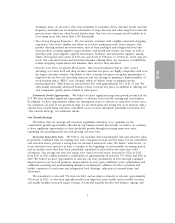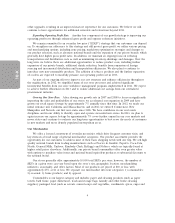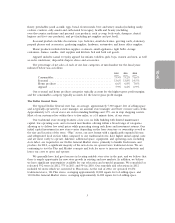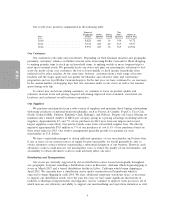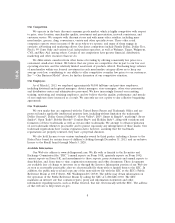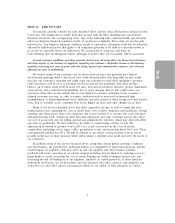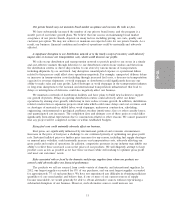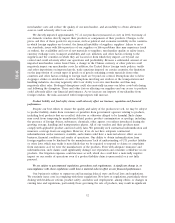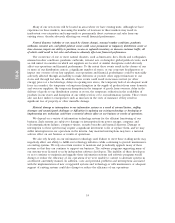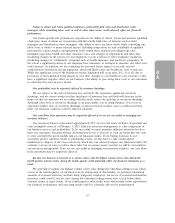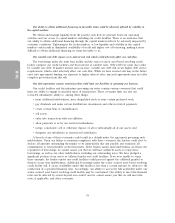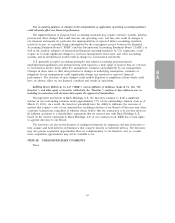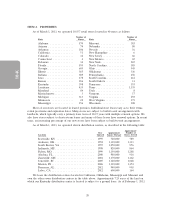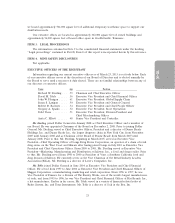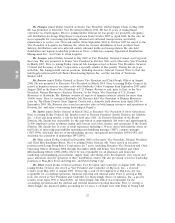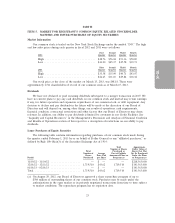Dollar General 2012 Annual Report Download - page 92
Download and view the complete annual report
Please find page 92 of the 2012 Dollar General annual report below. You can navigate through the pages in the report by either clicking on the pages listed below, or by using the keyword search tool below to find specific information within the annual report.
10-K
added expenses or may require extensive system and operating changes that may be difficult to
implement and/or could materially increase our cost of doing business. Untimely compliance or
noncompliance with applicable regulations or untimely or incomplete execution of a required product
recall can result in the imposition of penalties, including loss of licenses or significant fines or monetary
penalties, in addition to reputational damage.
Litigation may adversely affect our business, financial condition and results of operations.
Our business is subject to the risk of litigation by employees, consumers, suppliers, competitors,
shareholders, government agencies and others through private actions, class actions, administrative
proceedings, regulatory actions or other litigation. The number of employment-related class actions
filed each year has continued to increase, and recent changes and proposed changes in Federal and
state laws may cause claims to rise even more. The outcome of litigation, particularly class action
lawsuits, regulatory actions and intellectual property claims, is difficult to assess or quantify. Plaintiffs in
these types of lawsuits may seek recovery of very large or indeterminate amounts, and the magnitude of
the potential loss relating to these lawsuits may remain unknown for substantial periods of time. In
addition, certain of these lawsuits, if decided adversely to us or settled by us, may result in liability
material to our financial statements as a whole or may negatively affect our operating results if changes
to our business operations are required. The cost to defend future litigation may be significant. There
also may be adverse publicity associated with litigation that could negatively affect customer perception
of our business, regardless of whether the allegations are valid or whether we are ultimately found
liable. As a result, litigation may adversely affect our business, financial condition and results of
operations. See Note 9 to the consolidated financial statements for further details regarding certain of
these pending matters.
If we cannot open, relocate or remodel stores profitably and on schedule, our planned future growth will
be impeded, which would adversely affect sales.
Our ability to open, relocate and remodel profitable stores is a key component of our planned
future growth. Our ability to timely open stores and to expand into additional market areas depends in
part on the following factors: the availability of attractive store locations; the absence of entitlement
process or occupancy delays; the ability to negotiate acceptable lease and development terms; the
ability to hire and train new personnel, especially store managers, in a cost effective manner; the ability
to identify customer demand in different geographic areas; general economic conditions; and the
availability of capital funding for expansion. Many of these factors also affect our ability to successfully
relocate stores, and many of them are beyond our control. Tighter lending practices also may make
financing more challenging for our real estate developers which could impact the timing of store
openings under our build-to-suit program.
Delays or failures in opening new stores or completing relocations or remodels, or achieving lower
than expected sales in new stores, could materially adversely affect our growth and/or profitability. We
also may not anticipate all of the challenges imposed by the expansion of our operations and, as a
result, may not meet our targets for opening new stores, remodeling or relocating stores or expanding
profitably.
Some of our new stores may be located in areas where we have little or no meaningful experience
or brand recognition. Those markets may have different competitive and market conditions, consumer
tastes and discretionary spending patterns than our existing markets, as well as higher cost of entry,
which may cause our new stores to be initially less successful than stores in our existing markets. In
addition, our alternative format stores, such as our Dollar General Market and, to a lesser degree our
Dollar General Plus stores, have significantly higher capital costs than our traditional Dollar General
stores, and, as a result, may increase our financial risk if they do not perform as expected.
13


